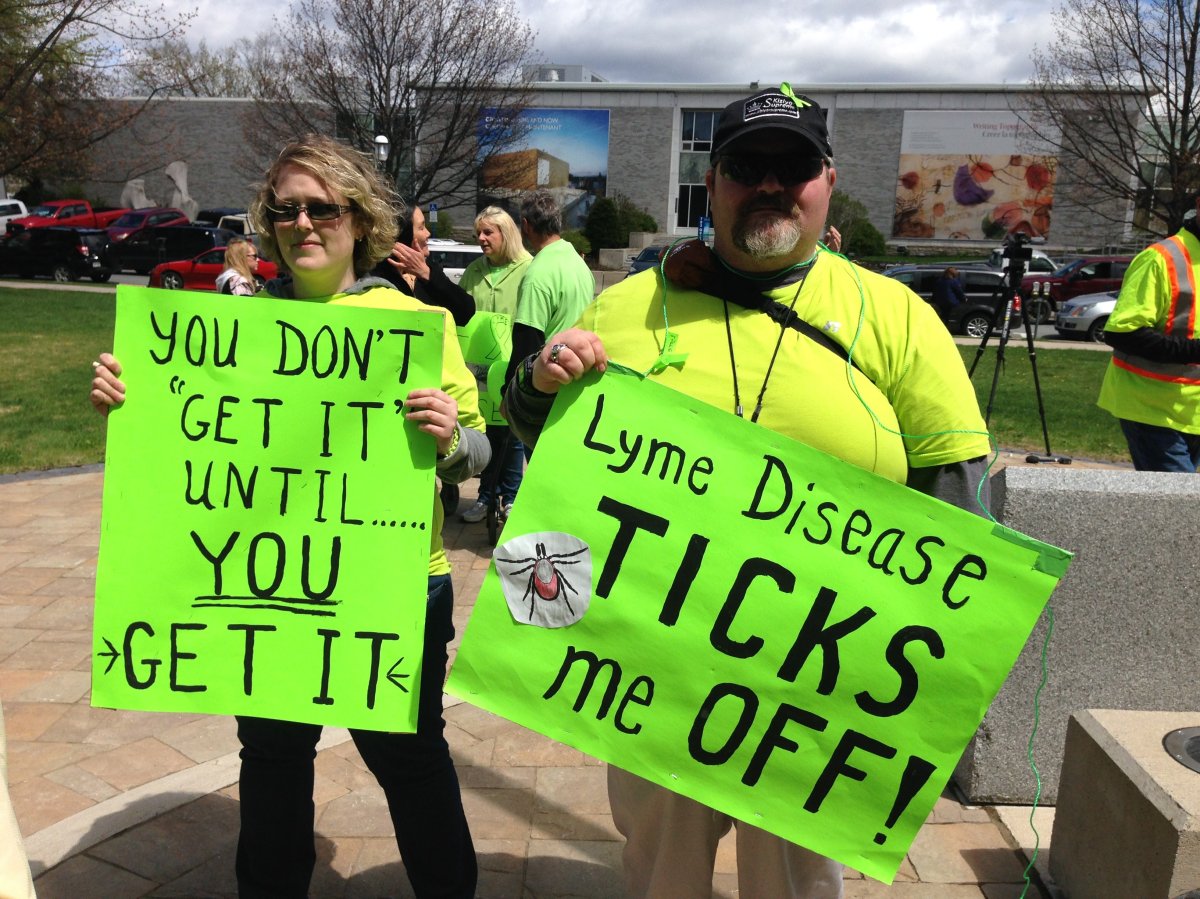People suffering from Lyme disease in New Brunswick are hoping for changes to federal treatment guidelines, claiming people who don’t notice ticks right away or aren’t diagnosed early aren’t getting the care they need.

Debbie Steward-Pilon said she has been suffering from Lyme disease since 2012, but she feels her doctor won’t send her for proper testing.
“I’m having more problems walking, remembering things, all kinds of things are just changing in my life,” Stewart-Pilon said at a demonstration held at the legislature Tuesday.
Those pushing for change suggested the current treatment guidelines are out of date and need to be changed so people living in the province can get treatment for chronic disease.
Steward-Pilon said every time she goes to see her doctor, he tells her she has something else.
Steward-Pilon’s son, Nick Pilon, said he gets frustrated watching his mother go through the fight with her doctor.
“It’s hard for me, personally, to see her struggling with so many things and have there possibly be a solution and just no way to get to it,” he said.
Pilon said his mother refuses to get a second opinion because she fears her doctor will be angry if she does.
She says both her dogs were diagnosed with acute Lyme disease and were treated, but in Canada doctors won’t prescribe antibiotics for more than 30 days.
Steward-Pilon’s father offered to pay for her to receive treatment in the United States, but she doesn’t want to leave home.
“I just want help where I live. That’s what I want.”
Green Party leader and MLA for Fredericton South David Coon said he found a tick once and was treated immediately with a month of medication.
Coon said there’s no problem addressing acute Lyme disease in the province for people who find the ticks quickly, but said it’s the chronic disease that’s a concern for those who don’t get immediate treatment.
“The province could take its initiative, which it should–its own initiative, but they’re waiting. So if we can get action federally, quickly, then all the provinces will follow suit automatically,” Coon said.
Coon said the province is waiting for a federal decision on the guidelines. The federal framework for Lyme disease conference is taking place in Ottawa this week.
“The conference is part of the process in developing a framework on Lyme disease – bringing together patients, researchers, health care providers and policy makers to discuss this disease,” Health Minister Jane Philpott told Global News.
Demonstration organizer Debbie McCann said there need to be changes.
“The current guidelines that are being followed are the Infection Disease Society of America guidelines, and they basically say, ‘don’t treat Lyme disease for any more than 30 days–that is for acute cases.’ They don’t believe in chronic Lyme disease, so they don’t believe in treating that at all, and they don’t believe it’s a persistent infection. They believe that Lyme disease is very easy to treat and that it’s quite rare. So those guidelines are what Canada is following currently,” McCann said.
She said less people would be sick if changes are made.
“The guidelines have to change because right now the push back that we get from government and the healthcare system is that, ‘we are following the guidelines’ and in all fairness to them, yes, they are following the guidelines. But the guidelines need to change, because we wouldn’t have the number of sick people here today if the guidelines were different,” said McCann.
Click here to visit the Government of Canada website detailing Lyme disease treatment guidelines
Bruce Ross also suffers from the disease. Every three months he drives two-and-a-half hours to Maine for treatment.
“I took treatment here in New Brunswick and the treatment didn’t work. I ended up going to the States for help. I go every three months to the doctor for help, which I shouldn’t have to do,” Ross said.
He said it costs him $500 to $600 dollars every few months. He said he can’t get treatment in Canada because the guidelines disagree with giving people long-term antibiotics.
Dr. Vett Lloyd with the department of biology at Mount Allison University is at the federal framework on Lyme disease conference. Lloyd said there needs to be a change to the guidelines.
“It’s an appalling situation we have now. Canadians should not have to leave the country to get health care that they desperately need, and that’s done at a huge personal cost in terms of the travel and the expense of it. And I think the measure of whether this conference works is whether Canadians can get the health care they need in Canada,” Lloyd said.
May is Lyme Disease Awareness Month.
- ‘Shock and disbelief’ after Manitoba school trustee’s Indigenous comments
- Canadian man dies during Texas Ironman event. His widow wants answers as to why
- Several baby products have been recalled by Health Canada. Here’s the list
- ‘Sciatica was gone’: hospital performs robot-assisted spinal surgery in Canadian first




Comments